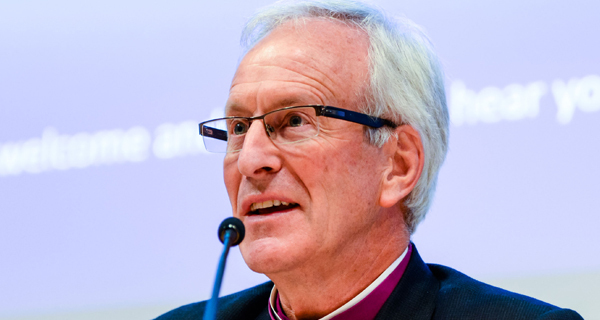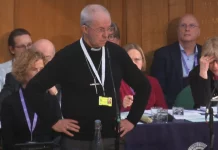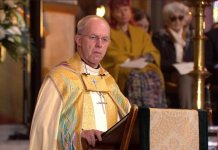[Printed 6 Feb 2020] The latest issue of Private Eye carries an article about bishops in the Church of England. It opens with comments about the recently published guidelines on heterosexual civil partnerships and moves on to comments about the Bishop of Birmingham, the Rt Revd David Urquhart. David Urquhart is the longest serving bishop in the C of E and convenor of the bishops in the House of Lords. He was among the majority of bishops who voted against same-sex marriage. An independent review last summer said Urquhart’s handling of an abuse disclosure was “problematic”, because “he lacked adequate knowledge of safeguarding and the capacity to manage the process.”
Private Eye says there are those in Birmingham diocese who question his own unusual domestic relationships.
“The bishop shares his official abode with a twenty-something Indian restaurant manager – on the top floor of Bishop’s Croft, the vast neo-classical bachelor pad he occupies in Harborne, Birmingham. Together they have travelled the world, and take regular private retreats in the bishop’s native Scotland. Urquhart’s care for the young man is so solicitous he penned a poem declaring that they are ‘bound for endless love’ which has been published on social media.”
My first thought on reading this was to reflect on how carefully Private Eye is, by implication, alluding to a possibility about the bishop. The second was to notice the ageism and racism implicit in the story. The third was to wonder how the bishop and the young man are feeling now. The fourth was to wonder how the other dozen lesbian, gay, and bisexual bishops are feeling. And the fifth was to feel angry with the bishops and the institutions of the Church of England that create and protect a culture in which to be LGBTI is something to be ashamed of. Among the bishops I have enjoyed conversation and friendship with are some whom I knew perfectly well to be gay and yet could never name this truth in conversation.
If David Urquhart is enjoying a loving relationship with this younger man, I am very, very happy for him. He is blessed. If he is being hurt by the Private Eye story, I feel sad for him. I know what it is like to feel ashamed of my sexuality. A loving relationship brings exquisite pleasure and the deepest contentment to our lives.
The guilty party in all of this is the bishops themselves, collectively, with one or two honourable exceptions. Some of them argue forcefully for what they claim are Biblical teachings that result in rank dishonesty and prejudice about LGBTI people in the Church of England. They are responsible for enforcing a closeted life on otherwise honourable, loving, deeply pastoral, and gifted people. The closet is the place where the heart’s desires and intimate sexual feelings are hidden behind a carefully constructed persona of spiritual idealism or faux-heterosexual celibacy.
Private Eye notes that in December senior bishops signed off on the “pastoral guidelines” which state that heterosexual couples in a civil partnership can’t have sex if God and the Church of England are to be satisfied. Several reversed up the aisle when the guidelines were made public last month. Eventually the Archbishops issued a non-apology. Private Eye says “falling short of God’s purposes for human beings” could best be translated as: “All that stuff about how wicked you are: we still think it. We just hadn’t meant to say it out loud.”
Whose job is it to ask the bishops themselves about their relationships, asks Private Eye, when bishops are required to ask newly partnered junior clergy to describe what is (or is not) going on behind the bedroom door. That might not be what bishops are required to do, but as the Birmingham story shows, the “what are you doing sexually” question is always in the frame.
There is no indication that any of the questions arising from the scandals of recent years are being learnt: the John Smyth Iwerne Trust scandal, the Peter Ball scandal, John Fletcher at Emmanuel Wimbledon, and the IICSA hearings. The material to be published by the Living in Love and Faith process is unlikely to tackle the issues that must be dealt with if the Church of England is to model the “radical inclusion” the Archbishops claim they want.
Archbishops Justin and John, you have no idea what radical inclusion looks like or requires. You need to spend time between now and July in sermons and lectures spelling out in detail the implications of radical inclusion for the Church of England. You won’t, of course. You are both still chained to an interpretation of Christianity that requires dishonesty, collusion, and avoidance of divine, sacred truth and reality. You and the House of Bishops lack the wisdom, courage and vision to be radically open to God’s unconditional, infinite love, goodness and intimacy in creation.










